Trending
Opinion: How will Project 2025 impact game developers?
The Heritage Foundation's manifesto for the possible next administration could do great harm to many, including large portions of the game development community.
An interview with Treasure Hunter Man 2 Creator Bernie

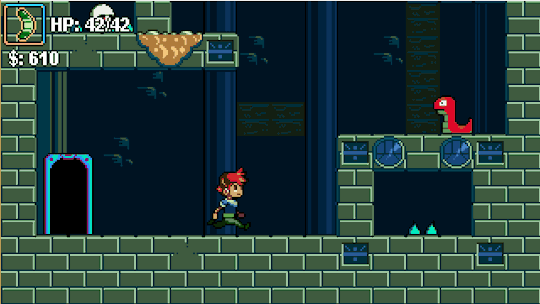
Bernie is a prolific, hobbyist game dev who recently released his latest game, Treasure Hunter Man 2. I got in touch with him during its development, and Bernie was generous enough to consent to the following interview on his games, their development, and game dev in general. Fans of indie metroidvanias, platformers, and adventure games, read on!
Thanks, Bernie, for agreeing to this interview. For starters, give us a brief history of your experience as a game dev.
I started out with a demo of Clickteam's Klik'n Play, which came with a computer magazine. There were ways to break the demo limits, too! I enjoyed finding out about those a lot more than most other things you could do with it. But then came The Games Factory and Multimedia Fusion, which were capable of so much more. These actually introduced me to programming logic, which you still needed in TGF if you wanted to make anything worthwhile. But Clickteam software managed to make learning programming logic fun in ways I wouldn't have expected. Some time later, I was shown Allegro and C++ by David Walton. That made me prefer actual written code. Then I taught myself Flash/AS3 and Unity3d and its scripting languages. After that I got into GameMaker: Studio, which is a joy to use. I'm still not a proper programmer, but I can do what I want to do most of the time. Which is all you really need for making games as a hobby.
What sorts of games do you yourself play, and which games have most influenced your own work?
I kind of got stuck in the early 90s console and PC era. I've consumed a huge amount of console JRPGs and PC RPGs, old-school console platformers and PC point'n click adventures. A lot of them are big titles - the Mario games, Monkey Island, Day of the Tentacle, Chrono Trigger. Then there are the freeware releases like 5 Days a Stranger by Yahtzee, numerous other Adventure Game Studio games, Lyle in the Cube Sector, Peeto's Revenge (both made with Clickteam software). If it's oldschool and pixelly, it probably did something for me.
(Below, Lyle in the cube Sector)
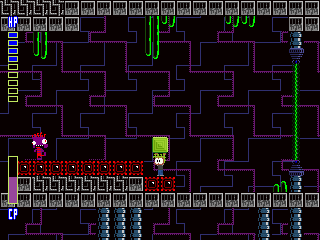
Which of your previous games are you most proud of ,and which would you recommend gamers new to your work play first?
I think Darkside Adventures is one the better ones, then comes Treasure Hunter Man. Unfortunately, the old Multimedia Fusion games don't like to scale up well on new computers, but they're still playable. I'd recommend trying my most recent games Unstrong and Treasure Hunter Man 2. Smash Star (A Game with a Kitty 5) was my first GameMaker game and turned out okay-ish. A lot of my other games are me experimenting with a new dev tool thing and turned out kind of weird.
(Below, Darkside Adventures)
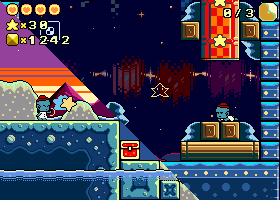
Treasure Hunter Man 2 is, of course, a sequel. For those who didn't play the original, please give us a sense of what sort of game the original game was.
I've always enjoyed the exploratory aspects of some Metroidvania style games. I wanted to make a not very serious game with these things in place. I didn't like the stories in newer Castlevania platformers (for example the DS ones), but still liked the gaming experience itself. This is why the stories in my platformers are always so simple. I want to save the big stories for other types of games - point'n click adventures and RPGs.
(Below, Treasure Hunter Man)
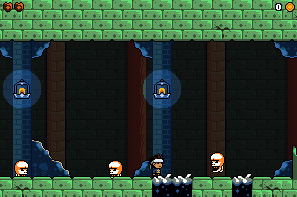
What made you decide to make a sequel?
Treasure Hunter Man was a little different than what I've made before. It felt like taking a break. And so I took another break a few years later.
How is THM2 different from its predecessor, and what should players expect from this game?
It's not really too different from the previous one, but the main character is a middle-aged woman this time around. I tried to streamline the gameplay a bit by removing the need to switch out weapons and making item usage simpler. It's also a tad faster, but not necessarily longer. It might be a bit hard overall.
(Below, Treasure Hunter Man 2)
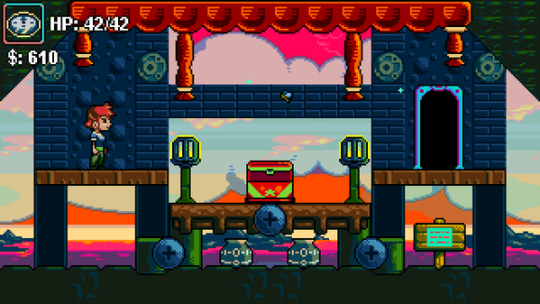
How long did you spend on the development of THM2, and what tools did you use?
THM2 was made on and off in about one and a half year. The actual development time is probably only a few weeks. I also tried my luck with other projects in-between.
The game was made in GameMaker: Studio. The graphics were drawn in Multimedia Fusion's sprite editor, and the music was made using a mix of free soundfonts, including some NES/SNES-sounding ones.
What were the greatest challenges in the making of this game, and how did you overcome them?
The biggest problem is finding time. It always is. Life gets in the way. And yes, life has to get in the way of developing hobby games, because the hobby has to know its place. Which is just a way of saying that sometimes there are more important things than gamedev happening, which leads to no gamedev happening.
If you work on commercial projects, these priorities might be different for you.
(Below, A Game With a Kitty)
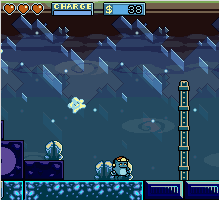
What did you enjoy the most about the development process and what do you hope for players to enjoy the most?
For some reason, the engine or framework creation is what I like best. Getting things to move along with platforms, coding cutscene and dialog systems, inventory windows, collision detection, enemy AI systems...
These are the things hidden to the players, they only see the result. And all I can do is hoping the result is fun enough for them to enjoy the games.
What's your advice to other game devs? Any best practices to share? Pitfalls to avoid?
If you want to make games for fun, you might want to steer clear of actual commercial projects. There are deadlines to manage and suddenly there's a whole different kind of pressure. It might take all the fun out of it.
When making platformers, consider using the same collision/platform routine for all moving objects. Make them flexible enough to suit your needs - resizable collision masks, for example. Then you only ever need to debug one movement framework. Effeciency may be a factor, but it tends not to be too much trouble on modern PCs.
When making point'n click adventures, try making a global cutscene system and block player input while it's running. Have it run through an action list one by one. The toughest part for 3rd person point'n clickers may be the pathfinding, but a lot of gamedev tools have it built in nowadays.
Use the right dev environment for the kind of game you want to make. It cuts down on a lot of work. Sure, you can make a pixel platformer in Unity3d, but they might be easier to do in GameMaker.
Lastly, check and debug everything 10 or more times. There's always something that manages to slip through the cracks.
These may not be the best practices, but those approaches sure paid off in my projects so far.
(Below, Reactor 09)
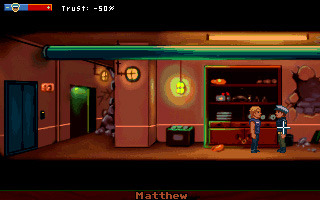
Any final thoughts on your work or the world of gaming in general?
Gaming is weird and it's always changing, and that's good. Let's make and play whatever we like! There's still so much room for new ideas and approaches and I want to see where it's all going.
Thanks, Bernie.
:)
See you around!
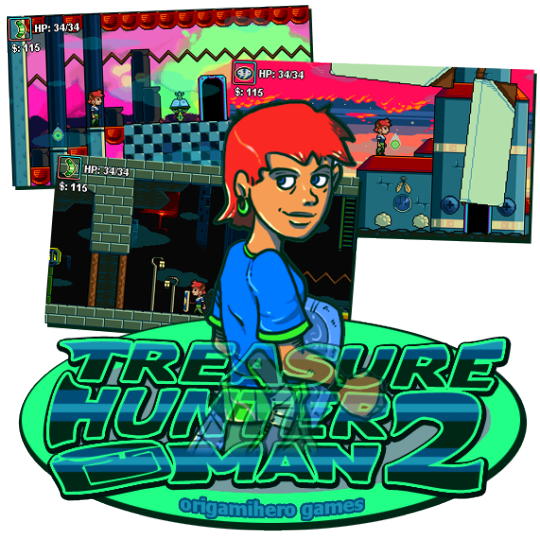
You can get Bernie’s games at his website origamihero.com or origamihero.itch.io and follow him on Twitter @OrigamiHero.
Read more about:
BlogsYou May Also Like